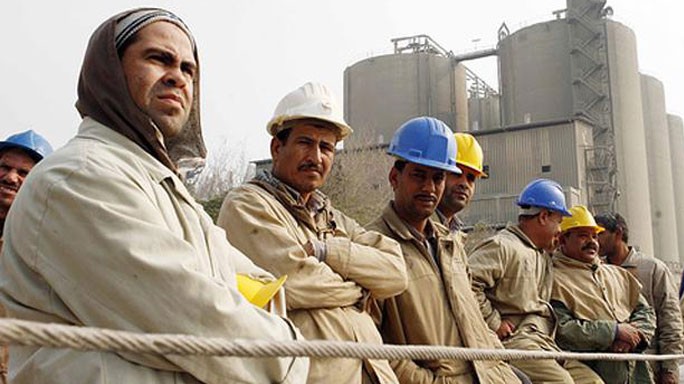Just days before Egypt holds a major economic conference to attract foreign investors, scores of workers held the latest in a string of protests outside government offices in Cairo, complaining they had not been paid for months and accusing officials of siding with the company’s investors. With some pushing and shoving, police broke up the gathering.
“This is only going to escalate,” said Tarek Tabl, a 52-year-old engineer who has led negotiations with the government trying to resolve the dispute. He and his wife, who also works for the construction company, have not gotten their salaries for five months. “I’d rather kill myself than go home and face my kids,” he said.
The company was among the first wave of state-owned enterprises privatized in the 1990s, when Egypt embarked on major economic reforms aimed at attracting foreign investors. Since then, the company’s workforce has been cut from 8,000 to 2,000. The investors are trying to sell off assets and have idled remaining workers. “This is the kind of investment that is producing only unemployment and chaos. We are turning into ticking time bombs,” Tabl said.
For many Egyptians, the experience from that era casts a shadow as the government of President Abdel-Fattah el-Sissi makes the most ambitious reforms in decades to lure foreign investors, with the conference opening Friday as a centerpiece.
Egypt needs a major injection of investment to fix an economy gutted by four years of turmoil since the 2011 uprising. This time, the government is offering around 50 major new projects for investors. Investment Minister Ashraf Salman has said the aim is to reduce unemployment from 13.1 percent to 8.5 or 9 percent in four years.
But with authorities trying to silence labor voices, activists fear the new push will repeat the problems of the past, when investment fueled growth but benefited only a small circle of businesses close to the government and military, leaving the population largely impoverished and the work force unskilled and unprotected. Growth from 2004-2010 was “buoyant,” averaging 5.5 percent a year, but failed to generate enough jobs, the International Monetary Fund said in a recent report.
See more at:
http://www.washingtonpost.com/world/middle_east/egypts-workers-fear-repeat-of-past-woes-in-investment-drive/2015/03/12/faf6764a-c885-11e4-bea5-b893e7ac3fb3_story.html





